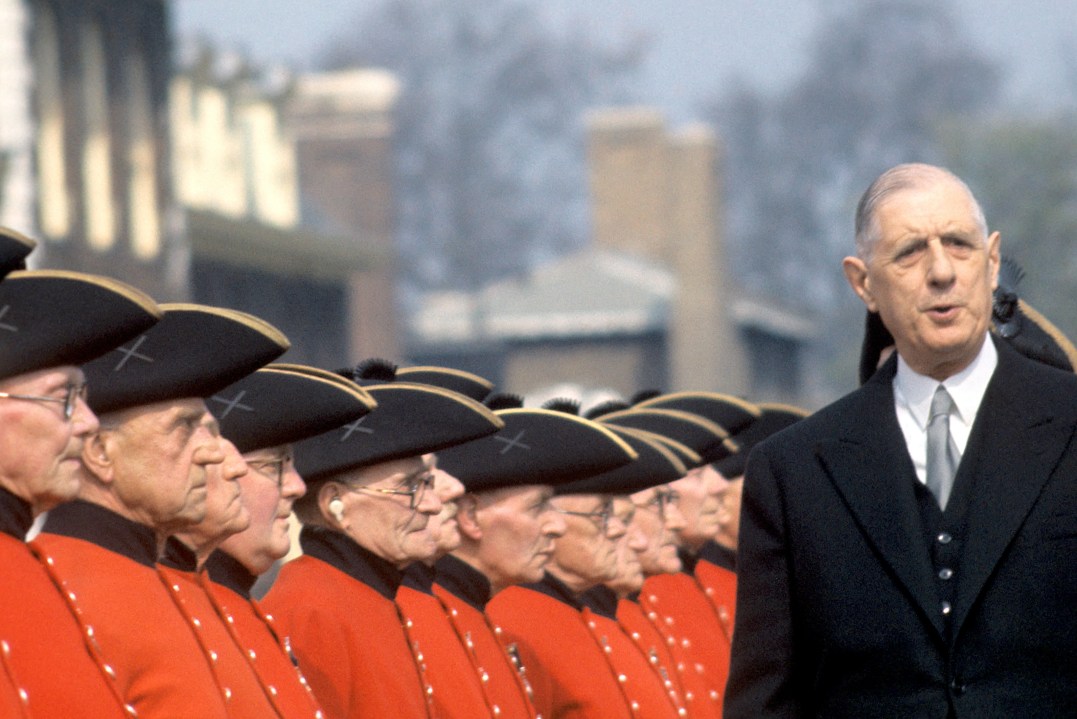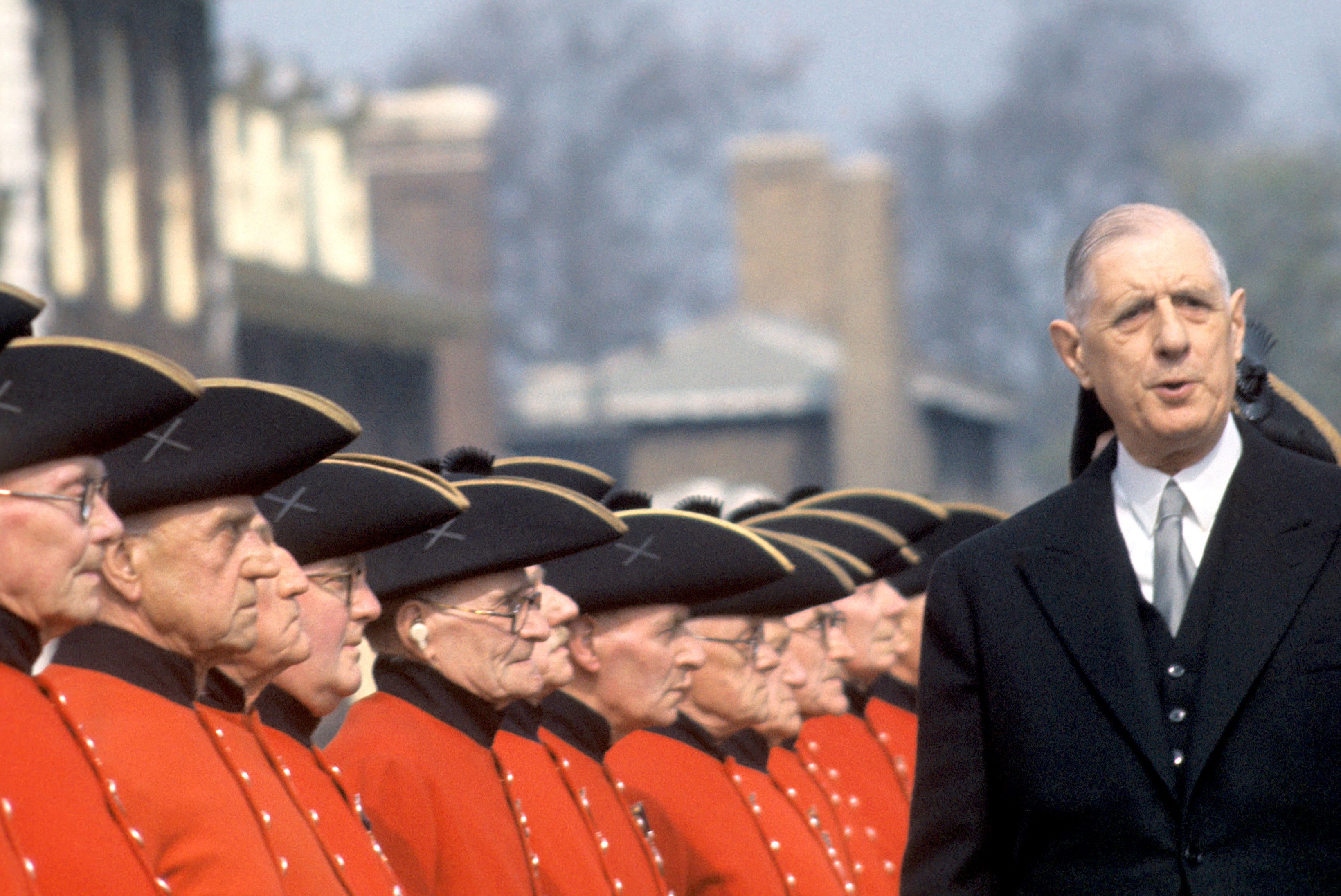Enoch Powell was a great admirer of General de Gaulle. That didn’t stop him, at the end of his career, rallying to the Ulster Unionist cause — rather ignoring the fact that de Gaulle happily sacrificed the French Algerians to the higher cause of France. In the same spirit as Powell, one hears talk today in conservative circles of the idea of Anglo-Gaullism; Peter Hitchens recently described himself in this way in an interview with Nigel Farage. What might this concept mean and is it true that Gaullism offers possible lessons for British conservatives today?
One problem with answering that question is that even in France it is hard to say what ‘Gaullism’ means. In his lifetime de Gaulle was a highly contested figure. There is not a politician, whether of the left or right, who does not now invoke his memory. Macron’s presidential photograph depicts him in front of a copy of de Gaulle’s war memoirs. Even the ultra-right politician Marine Le Pen solemnly pays homage today despite the fact that the founders of her party were sympathetic to those extremists who tried to assassinate de Gaulle in the 1960s for abandoning Algeria. In a satire on this contemporary cult of the old general, one author recently wrote an amusing book where de Gaulle comes back from the dead to save traditional French egg mayonnaise and defend gay rights.
De Gaulle’s attitude to Britain was ambivalent. In the long history he carried in his head, Britain was France’s historical enemy
Of course one can propose some genuinely historical answers to what ‘Gaullism’ might be. But the problem is that de Gaulle was so quintessentially French, his career was about addressing issues so specific to French history, that transporting Gaullism across the Channel is a perilous exercise. For example, after the word ‘France’, probably the most common word in de Gaulle’s writing is the word ‘state’. One of his obsessions was to provide France with a strong constitution in a country that had experienced such political turmoil since the revolution. His solution was France’s current Fifth Republic constitution. De Gaulle was a Jacobin, believing in interventionist government, technocratic modernisation, economic planning and the rule of experts. There could be nothing more Gaullist than Macron’s recent intervention on Covid which seems to move towards imposing mandatory vaccination; and this seems a world away from the peculiarly English form of conservatism espoused by Peter Hitchens.
But it is of course de Gaulle’s foreign policy, and in particular his European policy, that attracts some British conservatives. De Gaulle was obsessed with the protection of national sovereignty against interference. This applied to the United Nations and to Nato — and also to European supranational institutions. Before he returned to power in 1958, de Gaulle had opposed all the efforts of Jean Monnet to lay the foundations of a federal Europe; after 1958 he set about trying to organise Europe as a ‘concert’ of nation states. De Gaulle was not entirely successful in these ambitions, but in the famous empty chair crisis he was able to put a brake on the ambitions of the European Commission — instructing French delegates to abandon meetings where greater powers were to be ceded to Brussels. One can see why this side of de Gaulle has an attraction to some British conservatives.
Yet de Gaulle is always more complicated that he seems. One should not forget his extraordinary pragmatism, adaptability, refusal to be hemmed in by dogma — what in the 1920s he called his ‘doctrine of circumstances’. And this pragmatism is also visible in his attitude to Europe. Many ‘Europeans’ dreaded what he might do on his return to power in 1958 just after the Treaty of Rome had been negotiated. In fact, he decided to accept it lock stock and barrel and implemented its terms much more effectively than his predecessors would have done. Even during the 1965 empty chair crisis he took France to the brink but never over it.
De Gaulle was in his way a ‘European’. Although he believed in a historic European culture — of which Dante, Goethe, Chateaubriand, Shakespeare were all part — his Europeanism as a policy was unsentimental. He was a European because he was a realist. Everyone knows about de Gaulle’s almost semi-mystical belief in the ‘grandeur ‘of France. But this romantic side was also counterbalanced by shrewd and calculating realism. As a nationalist, he had elements of the Italian unification philosophy of both Mazzini and Cavour. He knew that the days when France could be ‘great’ alone had long passed; she needed Europe.
Brexiteers liked to quote de Gaulle’s veto of British entry to the Common Market in 1963 — that Britain is ‘incompatible with Europe’. His diagnosis of why Britain would not easily fit into Europe was prescient but the veto was exercised because he did not want a rival or an American trojan horse in Europe. That does not mean he thought keeping Britain out was best for Britain — but that it was best for Europe and for France. De Gaulle’s attitude to Britain was ambivalent. In the long history he carried in his head, Britain was France’s historical enemy.
Yet in 1940, when Vichy retreated into a fantasy of France alone, de Gaulle remained faithful to the British alliance — even if, as a proud man, he could not but resent his total dependence on British support between 1940 and 1944. He had great admiration for Churchill, but he was perplexed that the leader of what he considered a great nation could allow himself to become so dependent on the United States. He remarked in the 1960s: ‘Churchill was magnificent until 1942. Then, as if exhausted by the excess of effort, he passed the flame on to the Americans and abased himself before them’. For de Gaulle, after 1945, Britain made a series of choices that would lead inexorably to decline, marginalisation and vassalisation to the United States. Curiously for such an implacably humourless man, another Frenchman much admired by Enoch Powell was the comic actor Jacques Tati. Tati’s film persona, Monsieur Hulot, first hit the cinema screens in 1945 with a certain physical resemblance to de Gaulle. A well-meaning bumbler, M. Hulot would surely be a more appropriate model than de Gaulle, that cynical leader without illusions, and a world away from the fantasy politics of Brexiteer conservatives.







Comments